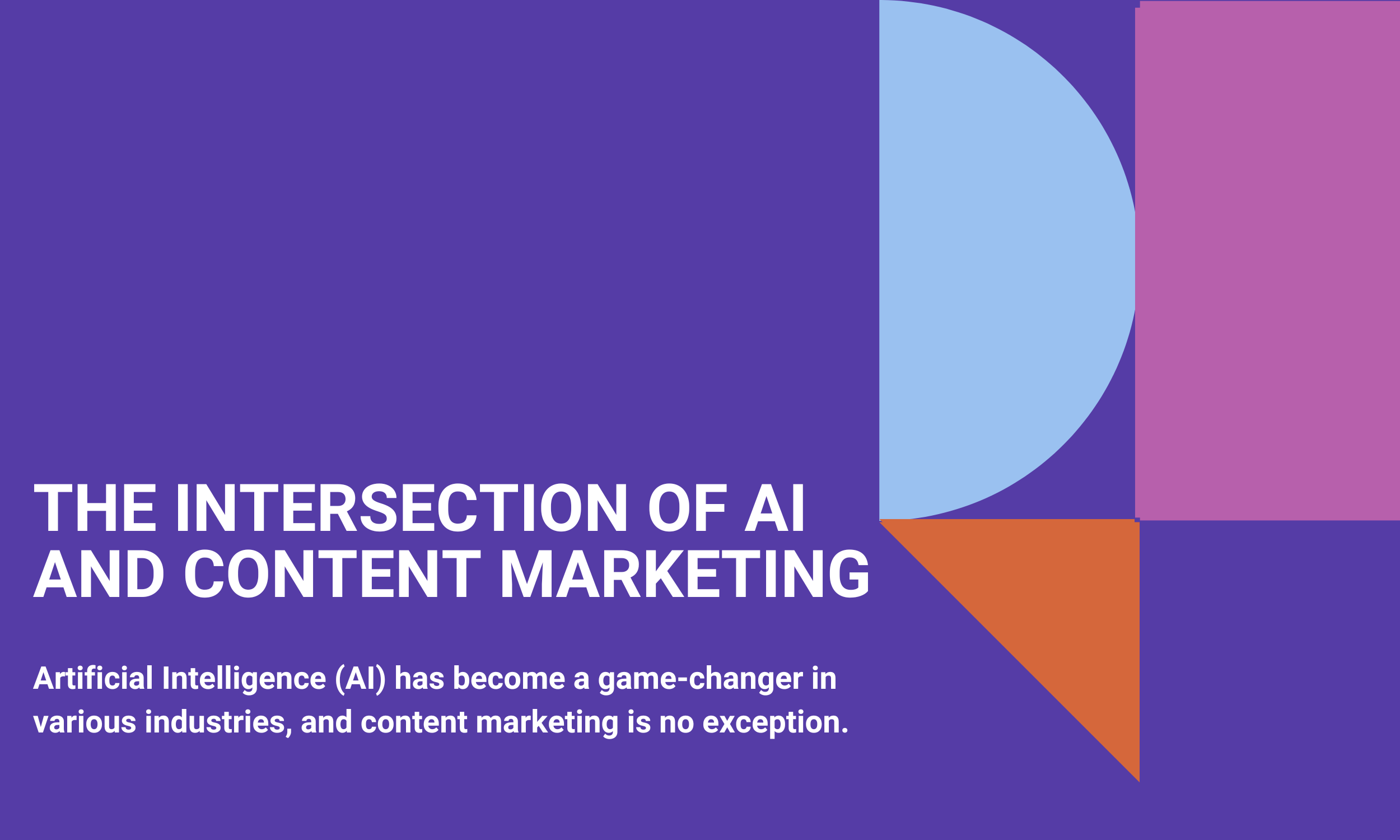Services List
Artificial Intelligence (AI) has become a game-changer in various industries, and content marketing is no exception. This article explores the intersection of AI and content marketing, the benefits, challenges, and future trends.

Covered in this article
The Emergence of AI in Content Marketing
AI and Data Analysis
Automation and Efficiency
Ethical Considerations
The Future of AI in Content Marketing
An Overview Of AI and Content Marketing Crossing Paths
Frequently Asked Questions about AI and Content Marketing
The Emergence of AI in Content Marketing
AI has revolutionised the way we approach content marketing strategies. It has become an essential tool for marketers to create better campaigns, reach their target audience, and gain deeper insights into consumer behaviour. AI-powered tools like chatbots, recommendation engines, and predictive analytics have become ubiquitous in the marketing industry, helping businesses increase customer engagement and drive revenue.
AI and Data Analysis
One of the most significant benefits of AI in content marketing is its ability to analyse vast amounts of data. With AI-powered analytics, marketers can gather insights from customer interactions, social media activity, and website behaviour to create more targeted campaigns. AI can also help companies predict customer behaviour and anticipate their needs, enabling them to deliver more personalised experiences.
Here is a quick breakdown of the breakthroughs your business can make with AI and data analysis:
Understanding Consumer Behaviour
AI-powered analytics tools can process and analyse vast amounts of data from various sources such as social media, website interactions, and customer feedback. This data is invaluable in understanding consumer behaviour. By analysing this data, AI can identify patterns and trends in consumer behaviour, providing insights into what type of content resonates with the audience, the best times to post content, and which platforms yield the most engagement.
Predictive Analytics
Predictive analytics is another area where AI shines. AI can use historical data to predict future behaviour. For instance, it can predict which type of content a user is likely to engage with based on their past interactions. This allows marketers to create more personalised content and experiences for their audience.
Sentiment Analysis
AI can also perform sentiment analysis, which involves determining the sentiment behind a piece of text. This can be particularly useful in content marketing for understanding how consumers feel about a brand or product. By analysing comments, reviews, and social media posts, AI can identify whether the sentiment is positive, negative, or neutral. This can inform a company's content strategy and help them address any issues or concerns raised by its audience.
Automation and Efficiency
AI in content marketing also brings the benefit of automating repetitive tasks. AI-powered tools like chatbots can handle routine customer service inquiries, freeing up staff to focus on more complex issues. AI can also streamline marketing workflows, allowing teams to create and launch campaigns more efficiently.

Ethical Considerations
Despite its many benefits, AI in content marketing is not without its challenges. One of the most significant challenges is the need for ethical considerations. AI has the potential to collect vast amounts of personal data, which raises privacy concerns. Companies must be transparent about their data collection and usage policies to build trust with their customers. They must also ensure that their AI-powered marketing strategies are not discriminatory and do not violate ethical standards.
While AI brings numerous benefits to content marketing, it also raises several ethical considerations that marketers must address. Let's delve deeper into these ethical aspects.
Data Privacy
AI's ability to collect and analyse vast amounts of data raises significant privacy concerns. Consumers are increasingly aware of their digital footprint and are concerned about how their data is being used. Companies must ensure they are transparent about their data collection practices and comply with all relevant data protection regulations. They should only collect data that is necessary for their operations and ensure that it is securely stored and handled.
Transparency
Transparency is another crucial ethical consideration. If a company uses AI to generate content, it should disclose this to its audience. Consumers have a right to know if the content they are consuming is generated by an AI or a human. Transparency builds trust with the audience and can prevent potential backlash if the use of AI is discovered later.
Bias and Discrimination
AI systems learn from the data they are trained on, and if this data contains biases, the AI system can perpetuate these biases. For example, if an AI content recommendation system is trained on data that contains gender or racial biases, it may recommend content that reinforces these biases. Companies must ensure that they use unbiased data to train their AI systems and regularly audit these systems to detect and correct any biases.
The Future of AI in Content Marketing
The future of AI in content marketing looks promising. As AI technology continues to advance, marketers will have access to more powerful tools and insights. For example, AI-powered chatbots will become more intelligent and able to handle more complex customer inquiries. AI-powered recommendation engines will become more accurate and able to deliver more personalised product suggestions.
AI will also play a significant role in shaping the customer journey. With AI-powered predictive analytics, companies will be able to anticipate customer needs and create more targeted campaigns. AI-powered personalisation will become more advanced, enabling companies to deliver hyper-personalised experiences to their customers.
Another area where AI will have a significant impact is in voice search. As voice assistants like Amazon’s Alexa and Google Assistant become more popular, companies will need to optimise their content for voice searches. AI-powered tools will play a crucial role in helping companies understand voice search queries and create content that is optimised for voice search.
An Overview Of AI and Content Marketing Crossing Paths
AI has transformed the content marketing industry, enabling companies to create more targeted campaigns, automate routine tasks, and gain deeper insights into consumer behaviour. However, the use of AI in content marketing is not without its challenges. Companies must ensure that their data is clean and accurate, and they must consider the ethical implications of their AI-powered marketing strategies. Despite these challenges, the future of AI in content marketing looks bright, with AI technology continuing to advance and provide marketers with more powerful tools and insights.
AI is already transforming marketing, and it is predicted to drive enormous change in the future. AI is not just a buzzword; it is a tool that can manage the rest of the marketing tools, integrating insights, leveraging discrete or "siloed" data sets to facilitate personalisation, and executing real-time decision-making.
Frequently Asked Questions About AI and Content Marketing
How does AI enhance data analysis in content marketing?
AI enhances data analysis in content marketing by processing and analysing vast amounts of data from various sources. It can identify patterns and trends in consumer behaviour, predict future behaviour using historical data, perform sentiment analysis to understand consumer sentiment and provide real-time insights. This allows marketers to create more personalised and targeted content.
What are the benefits of using AI in content marketing?
AI offers several benefits in content marketing. It can automate routine tasks, freeing up staff to focus on more complex issues. AI-powered analytics tools can provide insights into consumer behaviour, enabling marketers to create more targeted campaigns. AI can also predict customer behaviour and anticipate their needs, allowing for more personalised experiences.
What are the challenges of using AI in content marketing?
Despite its many benefits, AI in content marketing is not without its challenges. These include data privacy concerns, the need for ethical considerations, and the risk of over-reliance on AI. Companies must be transparent about their data collection and usage policies, ensure their AI-powered marketing strategies do not violate ethical standards, and maintain a balance between human creativity and AI capabilities.
What is the future of AI in content marketing?
The future of AI in content marketing looks promising. As AI technology continues to advance, marketers will have access to more powerful tools and insights. AI-powered chatbots will become more intelligent, recommendation engines will deliver more personalised product suggestions, and AI-powered predictive analytics will enable companies to anticipate customer needs and create more targeted campaigns. AI will also play a significant role in shaping the customer journey and optimising content for voice search.




